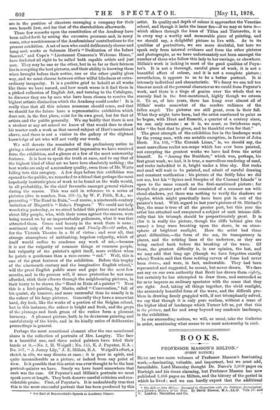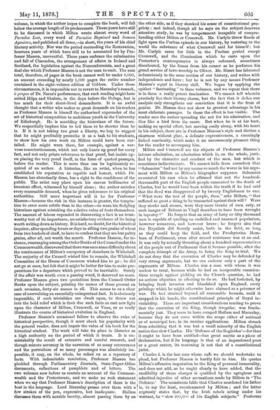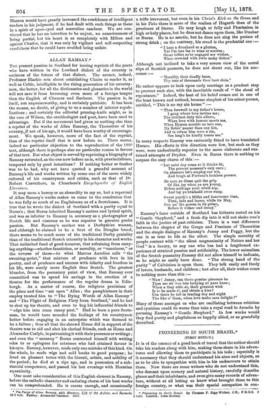BOOKS.
PROFESSOR MASSON'S MILTON.*
[FIRST NOTICE.]
HERE are two more volumes of Professor Masson's fascinating work,—fascinating, valuable, and important, but we must add, formidable. Lord Macaulay thought Dr. Nares's 2,000 pages on Burleigh and his times alarming, but Professor Masson has now published 3,466 pages on Milton, and the history of the period in which he lived ; and we can hardly expect that the additional
* The Life of John Milton: Narrated in Connection with the Political, Ecclesiaakat and Literary History of his Time. By David Masson, MA., LL.D. Vols. IV. and V. London: Macmillan and Co. •
volume, in which the author hopes to complete the book, will fall below the average length of its predecessors. Those years have still to be discussed in which Milton wrote almost every word of Paradise Lost, every word of Paradise Regained and Samson Agonistes, and published all three,—in short, the years of his chief literary activity. Nor was the period succeeding the Restoration, fourteen years of which have still to be accounted for by Pro- fessor Masson, uneventful. Those years embrace the culmination and fall of Clarendon, the arrangement of affairs in Ireland and Scotland, the legislation against the Nonconformists, and a great deal else which Professor Masson is not the man to omit. The sum total, therefore, of pages in the book cannot well be under 4,000, an amount exceeding by nearly 1,000 pages the entire number contained in the eight-volume edition of Gibbon. Under these circumstances, it is impossible not to revert to Macaulay's remark, apropos of Dr. Nares's performance, that such reading might have suited Hilpa and Shalum, in the days before the Deluge, but is too much for their short-lived descendants. It is an awful thought that a writer who makes so great demands on his readers as Professor Masson is himself the authorised expounder of the art of historical composition to ambitious youth in the University of Edinburgh. He is moulding the historians of the future. We respectfully implore him to tell them to be shorter than he is. If it is not taking too great a liberty, we beg to suggest that he might profitably prescribe it as a task to his students, to show how his own work on Milton could have been cur- tailed. He might warn them, for example, against a ner- vous conscientiousness, which not only hunts up proof for every fact, and not only prints references to that proof, but insists up- on placing the very proof itself, in the form of quoted passages, before the reader. This is more than can be legitimately re- quired of an author. A historian, like an artist, when he has established his reputation as capable and honest, which Dr. Masson has abundantly done, has a right to the confidence of the public. The artist may place upon his canvas brilliancies of transient effect, witnessed by himself alone ; the author satisfies every reasonable demand, when he gives references to his original authorities. Still more important will it be for Professor Masson--because the risk in this instance is greater, the tempta- tion to error more subtle than in the other—to warn his fledgling historians against mistaking the relative value of facts themselves. The amount of labour expended in discovering a fact is no trust- worthy test of its importance, no satisfactory evidence of its being worth writing down as history. It is hard, no doubt, for the historical inquirer, after spending hours or days in sifting two grains of wheat from two bushels of chaff, to have to confess that they are but paltry grains, after all, not worth the search. Professor Masson, for in- stance, rummaging among the Order Books of the Council under the Commonwealth, discovered that there was once some difficulty about the continuance of Milton's occupancy of chambers in Whitehall. The majority of the Council wished him to remain, the Whitehall Committee of the House of Commons wished him to go ; he did not go at once, but felt that it might be better for him to make pre- parations for a departure which proved to be inevitable. Surely if the affair was worth even a passing word, it deserved no more. Professor Masson gives two quotations from the Council Order Books upon the subject, printing the names of those present on each occasion, forty-six names in all. This seems to us a clear case of overvaluing an essentially unimportant fact. It is obviously impossible, if such trivialities are dwelt upon, to throw out into the bold relief which is their due such facts as cast new light upon the character of Milton, Cromwell, or Vane, or as really illustrate the course of historical evolution in England.
Professor Masson's occasional failure to observe the rules of historical perspective, though it must check his popularity with the general reader, does not impair the value of his book for the historical student. The work will take its place in libraries as a high authority on the period of which it treats. It is un- mistakably the result of extensive and careful research, and though minute accuracy in the narration of so many occurrences and the portraiture of so many personages was absolutely im- possible, it may, on the whole, be relied on as a repertory of facts. With indomitable resolution, Professor Masson has plodded through Parliamentary Journals, State-Paper-Office documents, collections of pamphlets and of letters. The two volumes now before us contain an account of the Common- wealth and the Protectorate, and we make no rash statement when we say that Professor Masson's description of these is the best in the language. Lord Macaulay passes over them with a few strokes of the pen, expressive, but inadequate. Hallam discusses them with notable brevity, almost passing them by on the other side, as if they shocked his sense of constitutional pro- priety; and indeed, though all he says on the subject deserves attentive study, he was by temperament incapable of compre- hending either Milton or Cromwell. Mr. Carlyle threw floods of light upon the Puritan episode in our history, by restoring to the world the substance of what Cromwell said for himself ; but Mr. Carlyle cares for little in the Puritan period except Cromwell, and the illumination which he casts upon the Protector's contemporaries is always coloured, sometimes discoloured, by the fumes from his censer as he performs his grand service of hero-worship to Oliver. Mr. Bisset has laboured industriously in the same section of our history, and writes with independence and force ; but he is not by any means Professor Masson's equal in literary skill. We began by applying the epithet " fascinating " to these volumes, and we repeat that there is in them a really potent fascination. We cannot tell wherein precisely lies their literary charm, but the fact that it defies our analysis only strengthens our conviction that it is the fruit of genius. Dr. Masson does not show to greatest advantage in his most elaborate passages. In these the effort is too visible. The reader sees the author spreading the net for his admiration, and flies like a bird from the snare. But when he is at his best, making no special effort, but moving easily along, with his heart in his subject, there are in Professor Masson's style and diction a clearness without glare, a delicate expressiveness, a cunningly linked continuity, which make it an uncommonly pleasant thing for the reader to accompany him.
Milton and Cromwell are the objects of Professor Masson's intense admiration, an admiration which is, on the whole, justi- fied by the character and conduct of the men, but which is sometimes indiscriminate. We cannot hide from ourselves that " Salmasius" had not by any means so much the worse in his argu- ment with Milton as Milton's biographer supposes. Salmasius overstated his case when he affirmed that not the hundred- thousandth part of the English people consented to the death of Charles, but he would have been within the truth if he had said that the deed was disapproved of by twenty Englishmen to one. "What were the rest of the people, then," asks Milton, "that suffered so great a thing to be transacted against their will ? Were they stocks and stones, were they mere trunks of men only, or such images of Britons as 'Virgil describes to have been wrought in tapestry ?" Ile forgets that an army of forty or fifty thousand men is capable of quelling an undrilled and unarmed population, however numerous, and however brave ; he forgets also that the Royalists did fiercely resist, both in the field, so long as they could keep the field, and the Presbyterian Mem- bers of Parliament, even after armed resistance was at an end. It was only by actually thrusting about a hundred representatives of the people out of Parliament that it became possible, after the complete triumph of the Army, to bring the King to trial. We do not deny that the execution of Charles may be defended by very strong arguments, but we can endorse only a part of the arguments of Milton. Charles was a man with whom it was useless to treat, because while he had an insuperable conscien- tious scruple against yielding on the Church question, he had no serious objection to affecting to do so. He had forfeited, by bringing fresh invasion and bloodshed upon England, every privilege which lie might otherwise have claimed as a prisoner of war. He had strained beyond all reasonable bounds, until it snapped in his hands, the constitutional principle of Royal in- violability. These are important considerations tending to prove that the execution of the King, though irregular, was funda- mentally just. They seem to have escaped Hallam and Macaulay, because they do not come within the scope either of national or of municipal law, in its routine applications. Milton shrank from admitting that it was but a small minority of the English nation that slew Charles. His Defence of the Regicides '—for thus it ought to have been entitled—has great merits as a piece of declamation, but if its language is that of an impassioned poet or a great orator, its reasoning is not that of a constitutional jurist.
Charles L is the last man whose cate we should undertake to plead, but Professor Masson is hardly fair to him. He quotes Milton's offensive imputation to the King of personal immorality, and does not add, as he ought clearly to have added, that the credibility of those charges is qualified by the egregious and admitted injustice of other accusations made by Milton in 'The Defence.' The monstrous fable that Charles murdered his father is, to say the least, countenanced by Milton ; and the latter expressly states that, by the Irish rebels acting under his warrant, he "slew 200,000 of his English subjects." Professor
Masson would have greatly increased the confidence of intelligent readers in his judgment, if he had dealt with such things as these in a spirit of open-eyed and masculine candour. We are con- vinced that he has no intention to be unjust, no consciousness of being partial, but his heart is so completely with Milton and against Charles, that it was only by vigilant and self-suspecting carefulness that he could have avoided being unfair.








































 Previous page
Previous page